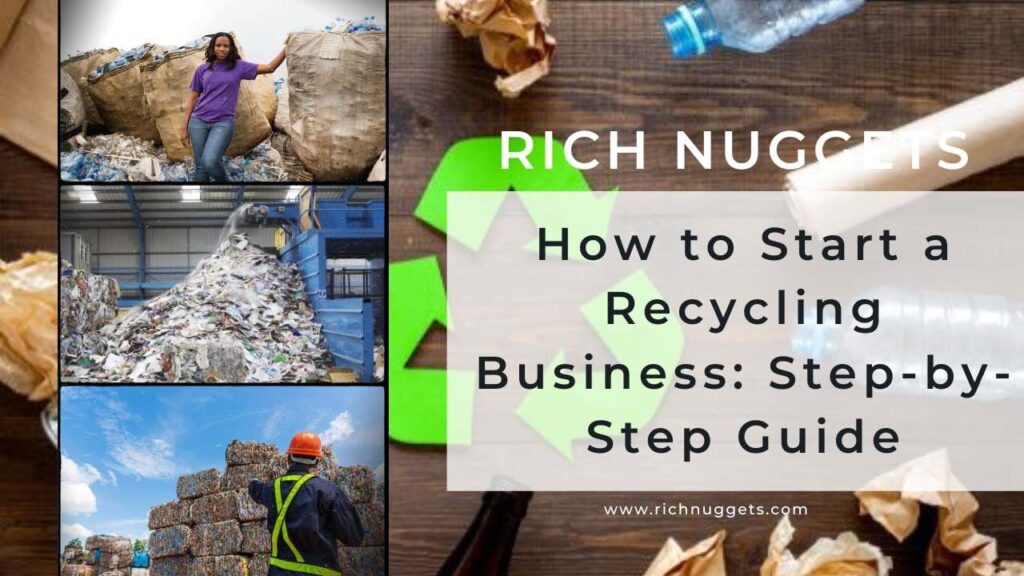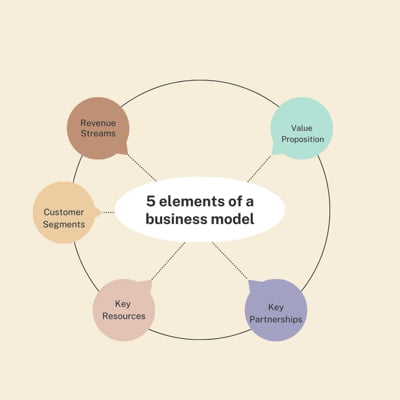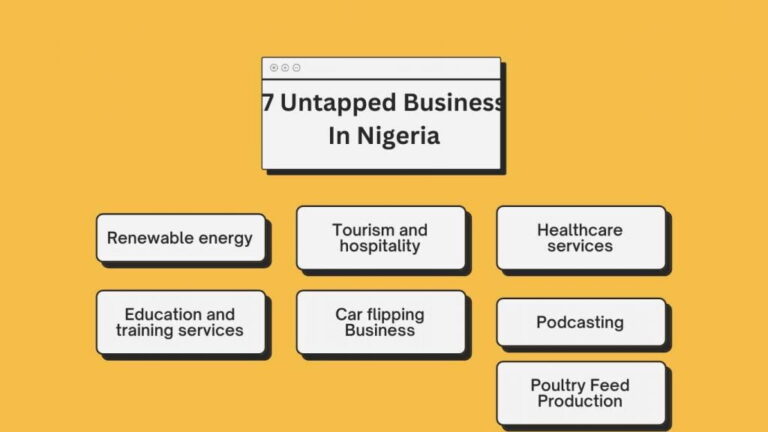
The recycling business in Nigeria involves the collection, processing, and conversion of waste materials into reusable products.
This industry plays a crucial role in environmental sustainability by reducing the amount of waste in landfills, conserving natural resources, and minimizing pollution.
In this article, we will be discussing the step-by-step guide on how to start a recycling business.
Table of Contents
1. Decide on What You Want to Recycle:
Deciding on what to recycle is a crucial step when starting a recycling business in Nigeria. This step involves determining the types of materials that your recycling venture will focus on.
The first task is to identify and list the specific materials you intend to recycle. Common categories include plastics, paper, glass, metals (such as aluminum and steel), and electronic waste. Each material has its own recycling process and market demand.
Some materials have higher demand due to their widespread use and potential for creating recycled products.
You can also decide whether you want to diversify and handle multiple types of recyclables or specialize in a particular material. Diversification can provide a broader market presence, while specialization allows you to become an expert in a specific niche.
By deciding on the materials you want to recycle, you lay the foundation for your recycling business. This decision influences your business model, equipment needs, and the relationships you establish within the recycling supply chain.
2. Decide on Waste Collection (Supply of Materials):
Deciding on the waste collection is a key step in the process of starting a recycling business in Nigeria.
This step involves planning how you will gather the recyclable materials you’ve identified.
The first thing you want to do is to create a detailed plan outlining how you will collect recyclable materials. This plan should consider the types of materials you’ve decided to recycle, the sources of these materials, and the logistics involved in collecting them.
When determining the primary sources of your recyclable materials. You may choose to focus on collecting recyclables from households, businesses, or collaborate with waste management agencies. Each source has its own set of challenges and opportunities, so understanding the dynamics of each can inform your collection strategy.
If you opt for household waste collection, you may need to establish partnerships with local communities. This could involve setting up collection points, educating residents on proper waste separation, and implementing a regular schedule for pick-ups.
For collaboration with businesses for waste collection, it requires building relationships with commercial entities. This may involve providing specialized collection services tailored to the needs of businesses, such as accommodating larger volumes of specific recyclables.
On the other hand, working with waste management agencies can provide access to a more organized waste stream. This collaboration involves integrating your recycling efforts into existing waste management infrastructure, contributing to a more systematic and efficient collection process.
When it comes to establishing efficient methods for collecting recyclable materials. You have to determine the right types of containers for collection, developing routes for collection vehicles, and implementing a schedule that ensures a consistent and reliable supply of materials.
3. Get Your Capital Ready:
Starting a recycling business requires a substantial amount of money that runs in millions. It is also possible to run a small recyling business that requires less than a million. But if the goal is to make your recycling business standard with quality productions, then it will require millions to make it possible.
This capital will be spent on:
- Equipment: Purchase or lease of machinery and tools needed for waste collection, sorting, and processing.
- Transportation: Costs associated with acquiring and maintaining vehicles for the collection and transportation of recyclable materials.
- Processing Facilities: Expenses related to setting up or upgrading processing facilities where recyclables will be sorted, cleaned, and prepared for recycling.
- Operational Costs: Budget for day-to-day expenses such as labor, utilities, maintenance, and other overhead costs.
To determine your exact capital requirement for your recycling business, you will need to conduct a comprehensive financial assessment that factors in all the aforementioned cost.
This financial assessment also called budget serves as a financial roadmap, helping you understand the capital required to launch and sustain your operations.
You can always explore various funding options to secure the necessary capital for your recycling business if you are having challenges coming up with the total required capital. Potential sources include:
- Personal Savings: Use your own savings to fund the initial startup costs. This demonstrates your commitment to the business.
- Loans: Consider applying for business loans from financial institutions. Be prepared to present a solid business plan to increase your chances of approval.
- Grants: Research and apply for grants available for environmental or recycling initiatives. Government agencies, non-profit organizations, and private entities may offer grants to support sustainable projects.
- Partnerships: Explore partnerships with investors, organizations, or businesses interested in supporting or collaborating on recycling initiatives.
4. Get a Good Location and Set Up the Processing and Recycling Facility:
Geting a good location and setting up the processing and recycling facility is another critical step in establishing a recycling business in Nigeria.
This step involves carefully selecting a location for your operations and setting up the necessary infrastructure for processing recyclable materials.
The first thing to achieve in this step is to select a location. This location should meet these three (3) criteria:
- Accessible for both waste collection and distribution of recycled products
- It complies with local zoning regulations and land use policies.
- It meets the space requirements for your recycling facility.
After you have chosen the perfect location for your recycling business, the next thing to do is to set up a processing facility equipped with the necessary machinery for sorting, cleaning, and processing recyclable materials.
The specific equipment required depends on the materials you’ve chosen to recycle. Common recycling equipment include:
- Shredders: Shredders are used to break down larger materials into smaller pieces. In recycling, they are commonly employed for processing materials like plastics, paper, and cardboard.
- Balers: Balers compress and bundle recyclable materials into compact and manageable units. They are often used for materials such as cardboard, paper, plastics, and metals.
- Sorting Systems: Automated sorting systems use conveyor belts, sensors, and other technologies to separate different types of recyclable materials. These systems are essential for streamlining the sorting process.
- Conveyors: Conveyors transport materials from one stage of the recycling process to another. They are integral for the efficient movement of materials within a recycling facility.
- Crushers: Crushers are used to reduce the size of materials, making them more manageable for further processing. They are commonly used in the recycling of glass and certain types of metals.
- Granulators: Granulators break down materials into smaller particles or granules. They are commonly used for processing plastics, turning larger plastic items into small, uniform particles.
- Magnetic Separators: Magnetic separators are used to remove ferrous metals from the recycling stream. This is crucial for preventing contamination and ensuring the quality of recycled materials.
- Eddy Current Separators: Eddy current separators use magnetic fields to separate non-ferrous metals from other materials. They are effective for recovering materials like aluminum from the recycling stream.
- Compactors: Compactors compress recyclable materials, reducing their volume. This is particularly useful for materials like plastics and paper, making them easier to handle and transport.
- Dust Collection Systems: Dust collection systems help control airborne particles in recycling facilities, improving air quality and creating a safer working environment.
- Bottle Crushers: Specifically designed for beverage containers, bottle crushers crush glass bottles, reducing them to smaller pieces for recycling.
- Washing Equipment: Washing equipment is used to clean and prepare materials for recycling. This is especially important for materials like plastics, which may need to be free of contaminants.
- Biomass Grinders: Biomass grinders are used to process organic waste materials, such as yard waste or food waste, turning them into compost or biofuel.
- Screening Equipment: Screening equipment is used to separate materials based on size. It ensures that only properly sized materials proceed to the next stage of processing.
- Densifiers: Densifiers compress lightweight materials, such as foam or certain plastics, into denser forms, reducing volume and facilitating easier transportation.
These pieces of equipment are essential for modern recycling operations, contributing to the efficiency and effectiveness of the recycling process while promoting sustainability and environmental conservation.
5. Meet the Legal Requirements:
This involves ensuring that your operations comply with the legal regulations governing waste management and recycling business.
These regulations are in place to safeguard the environment, public health, and ensure responsible business practices.
Thes are the legal requirments needed to establish a recycling business in Nigeria:
- Business Registration
- Tax Comliance
- Obtain Necessary Licenses and Permits
- Insurance
The recommeded insurance policy for a recycling business is the public liability insurance. This type of insurance protects your business in case of accidents, damages, or legal claims arising from your operations.
The following government agencies are involved in regulating aspects of recycling and environmental concerns in Nigeria:
- National Environmental Standards and Regulations Enforcement Agency (NESREA): NESREA is responsible for enforcing environmental laws, regulations, and standards in Nigeria. They play a role in regulating certain aspects of recycling activities that have environmental implications.
- Federal Ministry of Environment: This ministry is generally concerned with environmental policy formulation, coordination, and regulation. They are involved in setting overarching policies related to recycling and waste management.
- Waste Management Authorities: State and local government waste management authorities do have regulations and guidelines governing waste disposal and recycling within their jurisdictions.
- National Agency for Food and Drug Administration and Control (NAFDAC): If the recycling business involves the production or packaging of food or consumables, NAFDAC have regulations related to product safety and quality.
- Corporate Affairs Commission (CAC): This is the regulatory body responsible for the registration and regulation of companies and businesses in Nigeria. Compliance with business registration and legal requirements is overseen by the CAC.
By meeting the legal requirements, you establish a solid legal foundation for your recycling business. Compliance with regulations is essential for the long-term success and sustainability of your recycling venture.
6. Hire Employees:
To run an efficient and effective recycling business you need a capable team with the necessary skills for waste collection, sorting, and processing.
In a recycling business, several key positions must be filled to ensure the smooth and efficient operation of the enterprise.
Here are essential roles that should be occupied by skilled and knowledgeable personnel:
Business Owner/Manager: The owner or manager is responsible for overseeing the overall operations of the recycling business, including strategic planning, financial management, and decision-making.
Operations Manager: This individual oversees day-to-day activities, manages staff, and ensures that the recycling processes are running smoothly and efficiently.
Sales and Marketing Manager: Responsible for promoting the recycling business, building partnerships, and securing contracts with waste generators and manufacturers who will purchase recycled materials.
Waste Collection Coordinator: Manages the logistics of waste collection, including coordinating with collection points, waste pickers, or community partnerships to ensure a steady supply of recyclable materials.
Processing Plant Supervisor: Oversees the operations within the recycling facility, ensuring that equipment is functioning correctly, materials are processed efficiently, and safety protocols are followed.
Quality Control Officer: Monitors and maintains the quality of the recycled materials, implementing measures to reduce contamination and ensure that the materials meet industry standards.
Environmental and Regulatory Compliance Officer: Ensures that the recycling business complies with environmental regulations, waste management policies, and obtains necessary permits and licenses.
Human Resources Manager: Manages recruitment, training, and development of employees. Also responsible for addressing HR issues, promoting a positive work environment, and ensuring compliance with labor laws.
Finance and Accounting Officer: Manages financial aspects of the business, including budgeting, financial reporting, and monitoring expenses. Ensures that the business operates within budgetary constraints.
Safety Officer: Focuses on creating and implementing safety protocols within the recycling facility, ensuring a secure working environment for all employees.
Maintenance Technician: Responsible for the maintenance and repair of recycling equipment to minimize downtime and ensure that operations run smoothly.
Community Outreach Coordinator: Engages with the local community to promote recycling awareness, foster positive relationships, and encourage participation in recycling programs.
IT and Technology Specialist: Manages the implementation and maintenance of technology systems, including software for inventory management, data analysis, and process optimization.
Logistics and Transportation Manager: Coordinates the transportation of materials to and from the recycling facility, optimizing routes and ensuring timely deliveries.
Legal Advisor: Provides legal guidance, ensuring that the business operates within the confines of local, national, and international laws. Helps with contract negotiations and dispute resolution.
Having a well-defined organizational structure with individuals filling these roles helps ensure that the recycling business operates efficiently, complies with regulations, and achieves its environmental and business objectives.
The specific roles and titles may vary based on the scale and nature of the recycling operations.
On top recruiting skilled and knowledgeable staff, it is wise to also conduct comprehensive training programs for your employees on proper recycling procedures.
This includes educating them on the types of materials you handle, the sorting process, and the operation of recycling machinery.
The underlying fact about training is that it ensures that your team follows industry best practices, leading to higher-quality recycled products.
7. Promote Your Recycling Business:
Promoting your recycling business is about creating awareness, attracting customers, and establishing a positive reputation in the community.
Before you can spell out or list out all the marketing channels you will be using to promote your recycling business, you want to, first of all, sit down and come up with catchy marketing strategies that can easily get the attention of your target markets.
Effective marketing strategies for promoting a recycling business are:
- A compelling Message: Develop a compelling and clear message that highlights the benefits of recycling. Emphasize how your business contributes to environmental sustainability and the positive impact it has on the community. This message can be told in the form of stories, poetry, or in a formal way.
- Utilize Branding: Create a distinct and memorable brand for your recycling business. A well-designed logo, consistent color schemes, and a cohesive visual identity can help your business stand out.
- Educate Your Audience: Clearly communicate the environmental advantages of recycling. Highlight how recycling reduces waste, conserves resources, and minimizes the environmental impact compared to traditional waste disposal methods.
- Tell Success Stories: Share success stories or case studies that showcase the positive outcomes of recycling. This could include statistics on the amount of waste diverted from landfills or the environmental benefits achieved.
- Transparency: Through transparency is by being transparent about your business practices and commitment to sustainability. Share information about your recycling processes, eco-friendly initiatives, and any certifications or partnerships that demonstrate your dedication to environmental responsibility.
- Community Engagement: Engage with the local community through events, workshops, or educational programs. Participation in environmental initiatives and collaborations with schools or local organizations can strengthen your ties with the community.
When you get your marketing strategy right, then you can proceed to identify your marketing channels. Effective and efficient marketing channels used to promote recycling business are:
- Online Presence: Establish a strong online presence through a professional website and active social media profiles. Regularly update these platforms with informative content, news, and updates about your recycling efforts.
- Search Engine Optimization (SEO): Optimize your online content for search engines to increase visibility. This includes using relevant keywords and maintaining consistent business information across online directories.
- Offline Marketing: Explore traditional marketing channels such as local newspapers, radio, and community bulletin boards. Distribute brochures and flyers in strategic locations to reach a broader audience.
- Networking: Attend local events, business gatherings, and community meetings to network with potential suppliers, buyers, and partners. Building personal relationships can enhance the credibility and visibility of your recycling business.
By implementing a comprehensive marketing strategy that utilizes the aforementioned marketing channels to emphasize the environmental benefits of recycling and showcasing your commitment to sustainability, you can effectively reach your target audience, build brand awareness, and foster positive relationships within the community.
Profitable Recycling Business to Start
Here are the most profitable recycling business ideas you can start:
1. Metal Recycling: Recycling metals such as aluminum, copper, and steel is lucrative. These materials are widely used in manufacturing, and there is a consistent demand for recycled metal due to its cost-effectiveness and environmental benefits.
2. Electronic Waste (E-Waste) Recycling: With the increasing use of electronic devices, there’s a growing market for recycling electronic waste. Recovering valuable metals and components from old electronics is profitable. However, this area often requires specialized equipment and compliance with environmental regulations.
3. Plastic Recycling: Plastic recycling is in demand as the global focus on reducing plastic waste intensifies. Recycling plastics into raw materials for manufacturing or creating new products is a profitable venture. However, challenges such as sorting and dealing with different types of plastics must be addressed.
4. Paper Recycling: Recycling paper is a well-established industry. Recovering paper and cardboard for reuse in packaging and manufacturing is economically viable. This business is often more accessible for smaller-scale operations.
5. Construction and Demolition (C&D) Waste Recycling: Recycling materials from construction and demolition sites, such as concrete, wood, and metal, is profitable. As construction activities continue, there is a steady stream of waste materials that can be recycled into aggregates and other products.
6. Waste-to-Energy Conversion: Converting waste into energy through technologies like anaerobic digestion or incineration is a profitable solution for handling organic waste. This approach is more complex and may require significant investment in technology.
7. Tire Recycling: Recycling old tires into rubber products, asphalt, or other materials is a profitable niche. Tires are a significant source of waste, and there are markets for recycled rubber.
8. Glass Recycling: While glass recycling can face challenges due to transportation and sorting issues, recycling glass into new containers or construction materials is profitable.
It’s essential to conduct thorough market research, assess the specific needs and challenges of your local area, and consider the investment required before starting any of the aforementioned profitable recycling businesses.
Benefits of Recycling Business
Engaging in a recycling business offers various benefits, contributing to environmental sustainability, economic growth, and community well-being.
Here are some key benefits of starting and operating a recycling business:
- Waste Reduction: Recycling helps reduce the amount of waste sent to landfills, minimizing environmental impact and conserving valuable landfill space. By reusing materials, less waste ends up in disposal sites, reducing pollution and the depletion of natural resources.
- Conservation of Resources: Recycling conserves natural resources by reusing materials like metals, paper, and plastics. This reduces the need for extracting and processing raw materials, lowering the environmental footprint associated with resource extraction.
- Energy Savings: Recycling often requires less energy than manufacturing products from raw materials. For example, producing aluminum from recycled materials uses significantly less energy compared to extracting and refining aluminum ore.
- Economic Opportunities: Recycling businesses contribute to the economy by creating jobs in waste collection, sorting, processing, and manufacturing recycled products. This helps stimulate local economies and provides employment opportunities for individuals in the community.
- Revenue Generation: Recycling can be a profitable venture, generating revenue through the sale of recycled materials. Entrepreneurs can tap into markets for recycled metals, paper, plastics, and other materials, creating a sustainable business model.
- Environmental Conservation: Recycling reduces the need for extracting, refining, and processing raw materials, which often involves environmentally intensive activities. By using recycled materials, businesses contribute to the conservation of ecosystems and biodiversity.
- Reduced Greenhouse Gas Emissions: Recycling can help mitigate climate change by reducing the emission of greenhouse gases associated with the extraction, transportation, and processing of raw materials. For example, recycling paper instead of making it from virgin pulp can lower carbon emissions.
- Community Engagement: Recycling initiatives often involve community participation and awareness. Educating the public about the benefits of recycling fosters a sense of environmental responsibility and encourages sustainable behaviors.
- Waste Diversion from Landfills: Recycling diverts materials from landfills, helping to extend the lifespan of these disposal sites. This is particularly important as landfills can contribute to soil and water pollution if not managed properly.
- Innovation and Technology Development: The recycling industry drives innovation in waste management and recycling technologies. Advances in recycling technology contribute to more efficient and sustainable practices, benefiting both the environment and the economy.
- Corporate Social Responsibility (CSR): Businesses that engage in recycling demonstrate a commitment to environmental responsibility and corporate social responsibility. This can enhance their reputation and appeal to environmentally conscious consumers and investors.
- Circular Economy Promotion: Recycling is a key component of a circular economy, where resources are used, reused, and recycled to create a closed-loop system. This approach aims to minimize waste and maximize the longevity of materials and products.
Starting and operating a recycling business aligns with global efforts to address environmental challenges, create sustainable economies, and promote responsible resource management.
Challenges of Starting a Recycling Business
Here are the common challenges you will likely face if you want to start a recycling business in Nigeria:
- Inadequate Infrastructure: Limited waste collection infrastructure and recycling facilities in many areas of Nigeria pose challenges for a recycling business. Insufficient support from local authorities also hinders efficient waste collection and transportation.
- Lack of Awareness: Public awareness about the importance of recycling and proper waste disposal is low. This results in challenges in sourcing sufficient quantities of recyclable materials and convincing the public to participate in recycling initiatives.
- Financial Constraints: Limited access to capital and financial resources is a barrier to setting up and maintaining a recycling business. Acquiring the necessary equipment, facilities, and technology requires significant upfront investment.
- Inconsistent Supply of Recyclables: The inconsistent and unpredictable supply of recyclable materials is a challenge. Dependence on waste streams that may not be well-segregated or consistent in quality can affect the efficiency of recycling processes.
- Regulatory Hurdles: Negotiating the regulatory landscape, obtaining necessary permits, and complying with environmental regulations can be challenging. Complex and unclear regulatory processes pose obstacles to the establishment and operation of recycling businesses.
- Limited Market Access: Accessing reliable markets for the sale of recycled materials can be challenging. Establishing partnerships with manufacturers and industries that use recycled materials is crucial for a sustainable business model.
- Technological Constraints: Outdated or inadequate recycling technologies can impact efficiency and the quality of recycled materials. Investing in modern and efficient machinery is challenging due to technological constraints.
- Transportation Issues: Challenges related to transportation logistics, including the cost and availability of suitable vehicles, affect the collection and movement of recyclable materials to processing facilities.
- Cultural and Behavioral Factors: Cultural practices and behavioral factors can influence waste disposal habits. Convincing individuals and businesses to adopt proper waste separation practices is challenging, especially in areas where these habits are not well-established.
- Competitive Landscape: Depending on the chosen niche within recycling, there will be competition from informal or unregulated recycling activities. Managing competition while adhering to ethical and environmentally responsible practices can be a balancing act.
- Waste Contamination: Contamination of recyclable materials, particularly in areas with low awareness, can be a significant challenge. Contaminated materials reduce the quality of recycled products and may require additional processing.
Overcoming these challenges requires a combination of strategic planning, community engagement, regulatory compliance, and investments in technology and infrastructure.
READ ALSO:
- How to Start Scrap Metal Collection and Recycling Business: The Other Gold Mine
- How To Start Plastic Waste Collection and Recycling Business: Step-By-Step Guide
- How to Start Battery Recycling Business: Step-By-Step Guide
Final Thoughts on Starting a Recycling Business
Starting a recycling business requires careful planning, dedication, and a commitment to environmental sustainability.
Seek guidance from industry experts, stay informed about best practices, and continuously assess and improve your operations.
Discover more from StartBizEasy
Subscribe to get the latest posts to your email.





